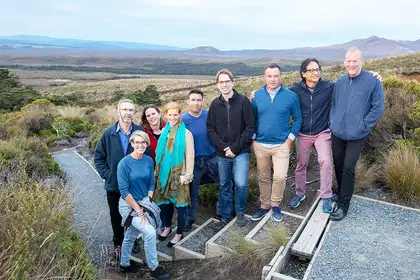
Members of the Mordor Accord between Massey and Wageningen Universities on the Tongariro Crossing: (from left) Professor Glenn Banks (Massey), Dr Trisia Farrelly (Massey), Dr Jessica de Koning (Wageningen), Dr Alice Beban (Massey), Dr Rob Fletcher (Wageningen), Professor Bram Buscher (Wageningen), Dr Matt Henry (Massey), Dr Pieter de Vries (Wageningen), and Dr Warwick Tie (Massey).
Social scientists from Middle Earth and Europe have joined forces to tackle urgent global issues such as food shortages, the environment, humanitarian aid, and more.
The Mordor Accord, referencing the Lord of the Rings film scenery where it was signed, resulted when researchers from the Sociology of Development and Change group at Wageningen University in the Netherlands visited New Zealand earlier this year. They were hosted by Massey University’s School of People, Environment and Planning.
Under the shadow of Mount Ngauruhoe (which doubles as fictional Mount Doom in Peter Jackson’s films) the team developed a work plan for collaboration addressing issues from the environment, food, political economy and development studies.
Head of the School of People, Environment and Planning, Professor Glenn Banks, says the school jumped at the opportunity to work with Wageningen. The Mordor Accord title “started as a bit of fun but it seems to have stuck”, he says.
“Massey and Wageningen have been working together for a number of years, which is unsurprising as both lead their respective countries in the agriculture rankings, but it is only just recently that we started a discussion between social scientists at the two institutions. We are essentially tackling the same sorts of challenges coming out of very similar agricultural institutions, but also we have a lot to offer each other in our respective areas.
“We find ourselves asking similar political questions about agriculture, the environment, development aid, and similar issues that are becoming critical issues in today’s world. The main objective of the collaboration is to kick-start joint teaching, research, grant development and to help strengthen and broaden the relations between the two universities.”
“We are looking to gain from their strength in Latin America and Africa, where they do a lot of work, but they also get a lot from us in other areas like the Pacific and Asia where they are looking to expand their research and are seeking networks and joint opportunities,” says Professor Banks.
The two schools are both involved in new areas of academic activity and debate within the social sciences, including agri-food and agricultural development; the relations between development and extraction; conservation and resource management; and tourism.
The intention is to translate these initial meetings into more concrete work programmes with joint publications, research grant development and applications, and staff and student visits and exchanges. Some of these are already underway – a Sociology PhD student Stella Pennell is leaving in mid-year for a three-month visit to Wageningen as part of her study.
In addition, a group of Massey staff from the School of People, Environment and Planning have been invited to attend a conference on sustainable development goals to eliminate global hunger in late August to coincide with Wageningen’s Centennial celebrations.
(Also participating in the project from Massey but not pictured are Dr Jeff McNeill, Dr Jane Richardson, Professor Regina Scheyvens, Dr Gerard Prinsen and Dr Sy Taffel).